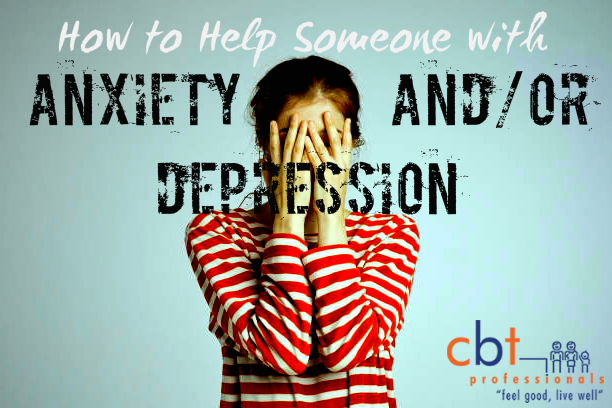How to Help Someone with Anxiety and/or Depression
Anxiety and Depression are common and serious mental health conditions that have the potential to result in significant distress and impairment. The Australian Bureau of Statistics estimates that approximately 45% of the Australian population will suffer from a mental health condition during their lifetime. Considering how common mental health issues are, chances are you will know someone who may be experiencing anxiety or depression.
Is someone close to you suffering from Anxiety and/or Depression? Do you want to support them to better health?
When someone close to you is suffering from Anxiety and/or Depression, it can be difficult to know what to do. This blog provides suggestions of what you can do to help support someone close to you.
-
Educate Yourself on Anxiety and Depression
Why should I educate myself on Anxiety/Depression? What information should I become familiar with? Where do I find this information?
“Knowledge is power”
The first step in supporting someone with Anxiety and/or Depression is to educate yourself. The more you understand, the better you can support someone.
There are a multitude of online resources available to find information to assist in your understanding of Anxiety and Depression. Although the indicators and effects of Anxiety and Depression can vary between individuals, there are a number of common symptoms to look out for. Becoming familiar with these can assist you in supporting those close to you.
Symptoms:
- Feeing sad, hopeless, or like they don’t care
- Sleep difficulties
- Appetite or weight changes
- Difficulty concentrating
- Irritability and/or anger
- Fatigue
- Loss of interest in activities
- Suicidal thoughts
- Isolation
- Avoidance behavior
- A sense of worry
- Inability to relax
- Body sensations (i.e., dizzy, breathlessness, shaking, sweating etc.)
- Slowed/negative thinking
If you have noticed any of these symptoms with someone close to you, the next step provides suggestions for providing and encouraging support.
-
Support and Encourage
What support should I provide? How do I provide the support?
Once you are well educated on Anxiety/Depression the next step is to provide support and encouragement. The supports you provide will depend on the individual you are assisting and their willingness to accept support. Remember not everyone will be ready to share/talk about their mental health and not everyone will be prepared to access support. But just remind them and yourself that the support is there when and/if needed.
i. Let them know you are there: A conversation can make a difference in helping someone with their battle and allow them to feel supported.
- Ask the question – Are you Ok?
- Let them know what you have noticed and why you are concerned;
- Spend time talking and encourage them to share their story;
- Let them know you are there to listen;
- Provide a space free of judgment;
- Be patient;
- Ask what you can do to help.
ii. Encourage engagement in basic self-care and daily activities:
- Encourage and support self-care: sleep, healthy eating and exercise;
- Make plans together: going for a walk, seeing a movie, doing things for fun;
- Encourage and support self-help: provide information on mental health, and suggest self-help resources (i.e., books, Apps etc.).
Supporting someone with Anxiety and/or Depression may also involve seeking professional help.
-
Encourage Professional Help
What professional supports should I suggest?
The final step in supporting someone with Anxiety and/or Depression may involve support and encouragement to seek professional help. Remember, seeking professional help can be a difficult step for many individuals with Anxiety and/or Depression. Continue to encourage and support their decisions in their recovery process. Remind them of the positive effects of seeking treatment and offer to make/attend appointments together.
i. GP: Suggest a general check-up with a GP.
- A GP can provide medication support and provide referrals to alternative supports and treatment.
ii. Support Services: Suggest and encourage engagement in community support services (i.e., Men’s Shed, Headspace).
iii. Psychological Therapy: A psychologist can provide evidence-based treatments to further assist in further recovery from Anxiety and/or Depression.
- A GP can provide a referral to a Psychologist.
- Medicare provides funding support to access 10 session of therapy per year.
- Individuals can also self-refer to Psychologists.
For more information about different types of psychology referrals, you can download our Referral Fact Sheet here and take it with you to your GP.
Resources
There are a multitude of available resources to assist with Anxiety and Depression. A few are listed below:
- Beyond Blue: https://www.beyondblue.org.au/
- Black Dog Institute: https://www.blackdoginstitute.org.au/
- Headspace: https://headspace.org.au
- Smiling Mind: https://www.smilingmind.com.au/
- Lifeline: https://www.lifeline.org.au/
-
Take care of your self
Supporting someone with mental health issues can be exhausting. Therefore our final tip here for those supporting loved ones with mental health problems is to ensure you are taking care of yourself too. This may include regular time-out for relaxing activities and hobbies, exercise, and eating a good diet – all important for your own mental health.
Disclaimer: Content on this website is provided for education and information purposes only and is not intended to replace advise from your doctor or registered health professional. Readers are urged to consult their registered practitioner for diagnosis and treatment for their medical concerns.
Blog written by CBT Professionals Clinical Psychologist on the Gold Coast, Renee Gentle. CBT Professionals are a team of clinical psychologists on the Gold Coast with offices in Coomera and Nerang. Gold Coast CBT psychologists offer services to adults, children, and couples. Please call and make an appointment on 56 683 490.
THREE CONVENIENT LOCATIONS
MOUNT GRAVATT
Mt Gravatt Medical PrecinctSE 105, 1808 Logan Rd
Upper Mount Gravatt QLD 4122


